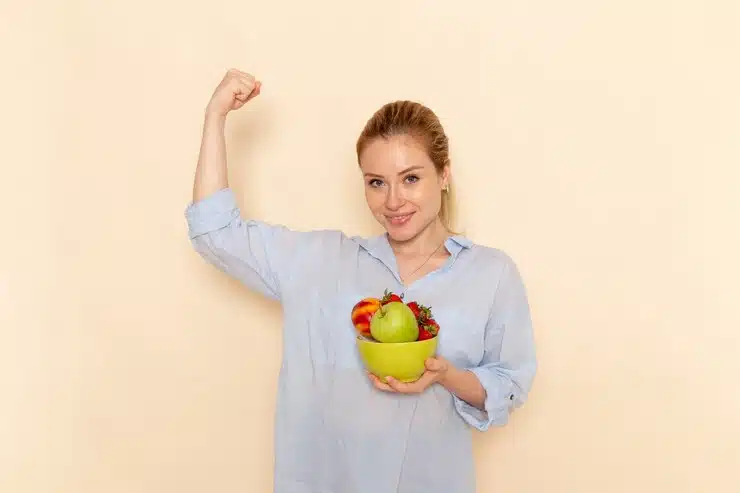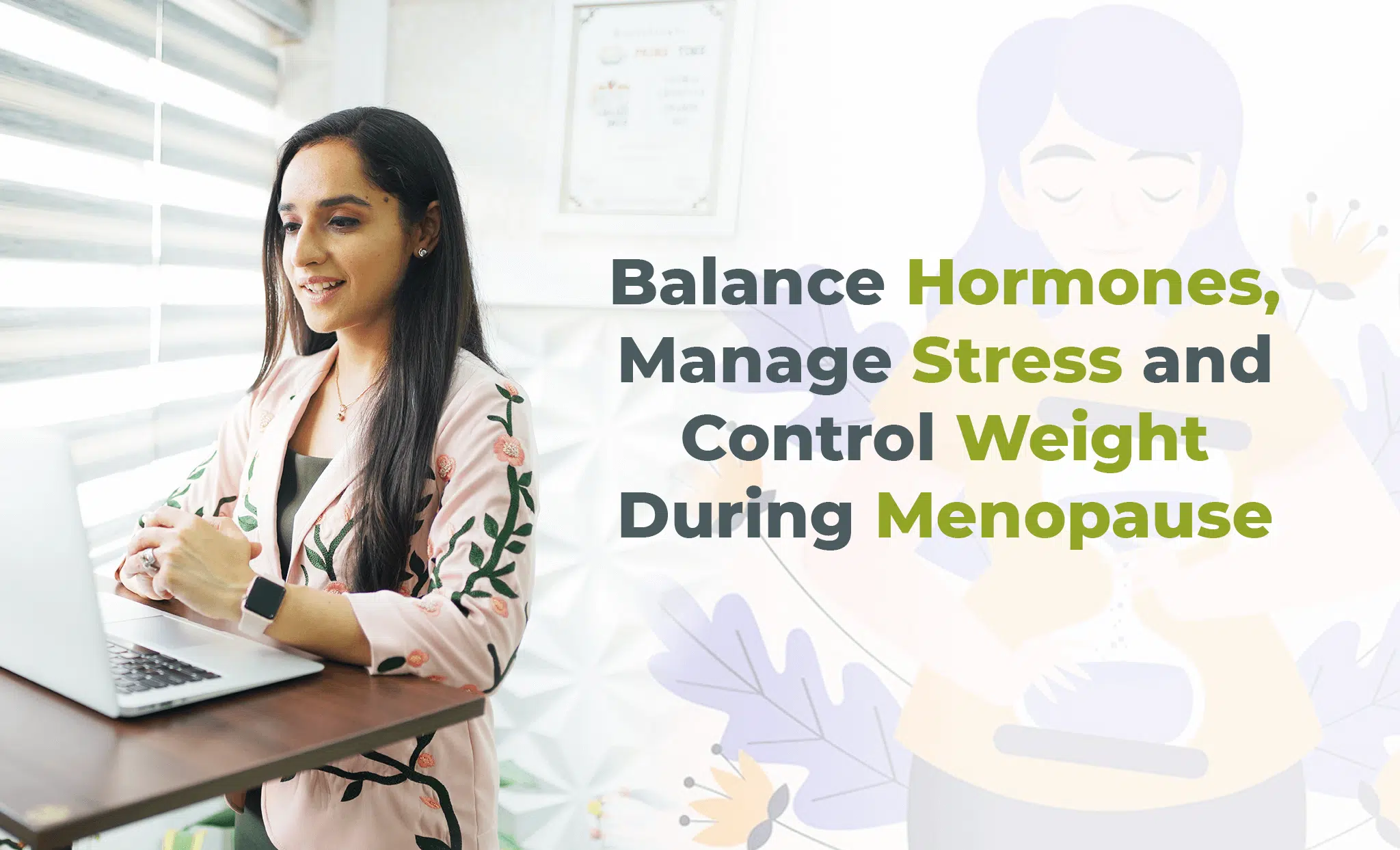This blog post is for everyone, ladies and gentlemen, who care for their daughters, sisters, and mothers.
So, What is the topic?
You might have observed that suddenly as mom approaches 40s and starts experiencing mood swings, hot flushes, sleepless nights, shortness of breath, low energy, and sudden abdominal weight gain. Yes, we are referring to MENOPAUSE.
To all the moms going through menopause, perimenopause, or dealing with confusing symptoms what to do, or how difficult it is, this blog is for you. Even if you haven’t hit this stage yet, it’s coming soon. In this blog post, we will explore the importance of managing cholesterol, handling stress, and managing weight during menopause.
Understanding Menopause
Menopause is a natural phase, but it’s more than accepting it. This journey, from puberty to menopause, is an investment – how you live now affects how your menopause will be.
Will it be a tough ride or a smooth transition?
It depends on how you’ve lived your life from puberty until now. When we hit menopause, we often think it’s a part of life – something to accept and move on from. While acceptance is good and helps you cope, there’s more to it. Acceptance, especially during menopause, eases the journey, giving you room to work on it. But, above acceptance, there’s a need for scientific understanding. Menopause requires attention to specific aspects of health. I’m here to tell you that you can make this transition smoother and more manageable with a little preparation and care.
1. The Role of Cholesterol Management

In the menopausal stage, if our reproductive system, or ovaries, isn’t working properly or has stopped, it doesn’t mean hormones have stopped releasing. We’ve got a backup organ for this!
Do you know which gland it is?
The backup organ for it is “An Adrenal Gland”. These reproductive hormones are managed by the adrenal glands during menopause. An adrenal gland is a small triangular organ located above the kidneys. When the reproductive organ doesn’t work, the adrenal gland steps in to take on its responsibilities. These glands take over the production of essential hormones such as androgens, estrogen, progesterone, cortisol, and even testosterone. The adrenal gland independently handles cortisol levels and other hormones. As menopause approaches, it takes charge of all these hormones.
Within the adrenal gland, the management of these functions depends on an essential raw material.
Do you know what is this essential raw material?
Cholesterol. Yes, cholesterol! So, if you’re on heart meds like statins during menopause, and they’re messing with your cholesterol production, it can impact these hormones also. Medications like statin block Coenzyme Q10 molecules which produce the cholesterol. When your body doesn’t produce enough cholesterol, it triggers hormonal imbalances as even Adrenal glands need cholesterol to manage these hormones. Understanding the link between cholesterol and menopause becomes crucial in navigating these health considerations. So, if you’re dealing with heart conditions or taking statins in menopause there are increased chances of hormonal disturbances if cholesterol isn’t managed properly.
Surprisingly, the adrenal gland doesn’t need good cholesterol (HDL) but bad cholesterol (LDL) for its work. LDL cholesterol is responsible for 80% of hormone production. Further, there are two variants of LDL cholesterol–Good and Bad, we need good LDL for proper functioning. This good LDL cholesterol is produced in the liver and is connected to the adrenal gland.
In simpler terms, if you’re avoiding desi ghee, having dry roti without it, and opting for healthier oils like avocado, olive, refined, palm, or soya oil and considering that we are eating good fats such as in nuts and seeds —thinking our menopausal phase will be good. We need to understand this – we derive essential cholesterol from animal sources, not plant-based sources. The plant-based source refers to seed oils like mustard seeds and coconut oil. We should use olive oil for frying or sautéing, not cooking. For Indians, we should use seed oil for cooking vegetables. Here, it’s important to note that plant-based oils, specifically seed oils, don’t contain cholesterol. If you need cholesterol, it’s sourced from animal-based products. Understanding this is crucial for a healthier lifestyle.
- Non-vegetariansget cholesterol from seafood, egg yolk, and chicken, managing their cholesterol levels.
- For vegetarians, A2 milk and dairy products, along with desi ghee, can help maintain cholesterol levels. Consuming paneer 2-3 times a week is beneficial, and fresh cream from milk is okay. However, be cautious with milk intake, especially if it’s not organic, as it can cause hormonal disturbances.
- For those with autoimmune disorders, avoiding direct sources of milk is advisable. If you must consume it, heat it and use it in the form of desi ghee, paneer, or cream. This helps reduce therisk of lactose affecting your insulin levels.
This shows why managing cholesterol is important. Insufficient cholesterol leads to muscle pain and persistent symptoms. Understanding this dietary routine will go a long way in ensuring a smoother menopausal journey by managing cholesterol as well as hormonal levels.
2. Managing Stress During Menopause

Menopause marks a turning point, bringing along the challenge of handling stress. Why? Because this is the time when your children are tying the knot – a U-turn in life. It’s like hitting the brakes, your body urging you to ease up and find calm, while your mental stress levels increase.
The more stress you face, the harder it hits your cortisol levels, affecting the production of good LDL, an essential element for your body. It’s crucial to focus on your mental well-being during this phase – think of it as a yogic stage rather than one of indulgence ( bhogi ) stage. The indulgence stage means we crave everything ( we want to do everything and have increased needs ). It comes to an end during menopause.
You enter the yogic stage, a kind of retirement phase, where your body relaxes both
mentally and physically. It’s a time for your mind and body to attach to consciousness. Embrace this transformative period with mindfulness.
3. Weight Management During Menopause

One of the most common concerns during menopause is:
“My weight is not going”
“I am unable to lose the weight”
“ What can we do for weight?”
Weight management is a big concern during Menopause. Unwanted abdominal fats make losing those extra kgs a challenge.
Here as I say “Acceptance is the most important thing”.
During menopause accept and embrace the natural aging process. Accept your wrinkles and graying hair. It’s about making aging a graceful experience, finding fulfillment, and enjoying the journey.
But, if you go in the complaint -mode, the question Why is this happening? It was not happening before. It was fine earlier? Why is Fat coming here now? The higher the complaint mode and the lower the gratefulness and gratitude your cortisol will increase.
This leads to increased stress causing more hormonal imbalances.
When it comes to weight, consider this:
- Healthy lifestyle– If you’ve invested in yourself from puberty to menopause through a healthy lifestyle, dealing with weight gain during menopause becomes more manageable. This approach recommended by the best dietitian in India protects you from knee pain, diabetes, and hypertension.
- Unhealthy lifestyle—But, if you have an unhealthy lifestyle, along with continuous stress and not taking care of yourself physically as well as mentally then expecting a smooth transition may lead to difficulty in acceptance.
To deal with these symptoms, take active care of yourself.
The Power of Strength Training: Building Body and Mind during Menopause

Investing in a healthy lifestyle from puberty to menopause, which includes strength training, can make it easier to manage weight during this phase. But if you’re just starting exercise during menopause, it’s important to start slowly and avoid pushing your body too hard. To avoid unwanted injuries.
Strength training is a great way to build muscle tissue. It prevents fat accumulation and ensures your bones have sufficient weight. Muscle mass tends to decline as menopause progresses. It shows the need for consistent strength training to rebuild it. For those not currently engaged in any physical activity, start add-ons such as yoga into your routine. The more you engage in physical activities, the stronger your bones become, reducing the risk of osteoporosis or osteomalacia during menopause. The more you do strength training, abdominal fats or visceral fat will not tend to deposit around your abdomen. Embrace the challenge, work hard, and stay strong, both mentally and physically.
To Sum it Up
Embrace Every Phase of Life. Menopause is a transformative phase in a woman’s life. Focus on cholesterol management, stress reduction, vitamin D intake, increased immunity, and weight management. By making the right choices and maintaining a healthy lifestyle throughout your life, you can transition through menopause with ease and grace.
If you’re seeking support during menopause and other life stages, I encourage you to consider our wellness program batch 17 that had already begun from November 18th. This program provides in-depth knowledge and guidance tailored to various life stages, including puberty, pregnancy, post-pregnancy, and menopause. It’s a chance to embrace the changes, invest in yourself, and make the most of every phase of life.
After all, life is a journey, and every phase has its unique beauty.

